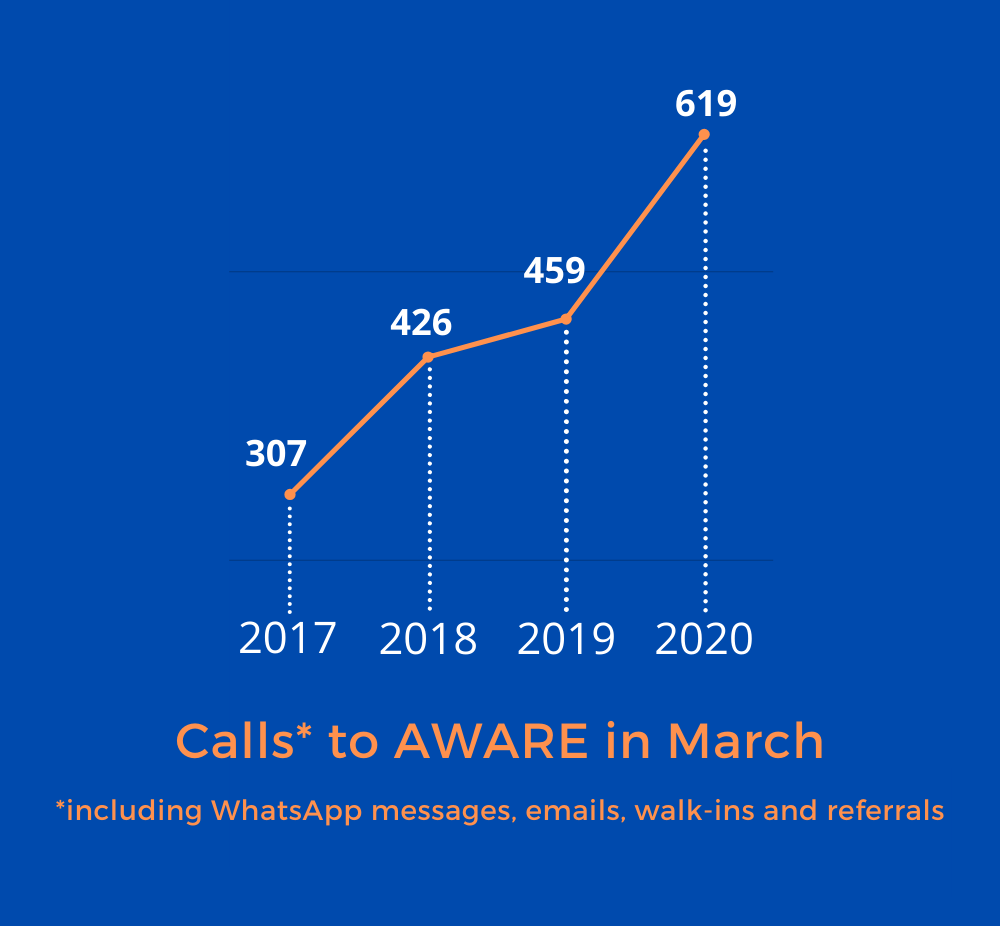As of Apr. 7, enhanced safe distancing measures has kicked in in Singapore.
Most workplaces have shut and people have started telecommuting. PM Lee Hsien Loong has also advised Singaporeans to stay at home and only leave the house to do "essential" things.
What this means is that more people will be expected to spend more time at home.
For those fortunate enough to retain their jobs, finally being able to work from home feels like paradise.
But for a growing number of families across the island, home is no different from a prison.
Worrying trend of domestic violence globally
In the context of the Covid-19 crisis, there has been an increasing trend of domestic violence globally as more countries go into lockdown.
Family violence can be defined as violent, threatening, coercive or controlling behaviour that occurs in domestic or intimate relationships.
It can manifest itself as physical - such as slapping and threatening with objects; or as psychological - as when a victim is humiliated, threatened, or made fearful by an abuser's words.
Abuse can also happen to anyone, regardless of age or gender.
Often, the abuse is rooted in control and power. And home isolation is giving more power to the abuser.
Globally, lockdowns and quarantines have affected victims of domestic abuse, as this 'traps' victims with their abusers at home, Al Jazeera reported.
In the U.S., Time reported that the National Domestic Violence Hotline has recorded a growing number of callers say that their abusers are using Covid-19 as a means of further isolating them from their friends and family.
Some have also threatened to throw their victims out on the street so they get sick.
Covid-19 and domestic abuse
Singapore is part of this worrying trend, with gender equality advocacy group AWARE reporting a spike in reports of family violence.
In March alone, they recorded 619 monthly distress calls -- their highest number ever.
 Infographic courtesy of AWARE
Infographic courtesy of AWARE
AWARE noticed that within these calls, there was a sharp uptick of individuals reporting emotional and psychological abuse.
In their analysis of distress calls in February 2020, they found that calls related to family violence had increased by 33 per cent.
Why is it spiking now?
AWARE's head of Research and Advocacy Shailey Hingorani explained why this might be happening, in a report by CNA.
She offered some reasons:
Firstly, the chaotic health and economic situation stresses abusers, so they might lash out at their victims to regain some semblance of control.
Secondly, there is less social support for the victim from family and friends.
Usually, eagle-eyed friends and colleagues might notice something amiss, and then step in to intervene or to offer their homes as sanctuaries. But with the current fear of their elderly residents or children getting infected, many would be reluctant to open their homes to victims.
Social services are also stretched, as movement control measures impede social workers from physically meeting with victims.
Crisis shelters might have to take precautions and reduce capacity if they deem the risk of infection to be high.
Lastly, as an economic recession is bound to happen, victims who have their finances controlled by their abusers would find it difficult to leave the relationship.
To leave the relationship, they would need some form of financial independence, such as a secret stash of money.
Parents may also be experiencing more stress during this period.
Today also quoted Kristine Lam, lead social worker from family violence specialist centre Care Corner Project Start, explaining that work used to provide victims with a period of respite from issues at home.
For parents with school-going children, they may find themselves having to double up as both an educator and parent during this period.
This leads to heightened stress, and also more opportunities for conflict and abuse given that they are all at home.
Social services being affected as well
Globally, the UN Secretary-General Antonio Guterres has called on governments worldwide to make sure the prosecution of abusers continues, and to set up emergency warning systems.
But being forced to stay at home may also affect how a victim seeks help. Some services may also be affected.
For instance, Hingorani highlighted that social services in Singapore have reported their lack of funding and a dip in number of volunteers during this period.
Currently, AWARE's walk-in service has been temporarily discontinued.
However, they will continue to provide other services (such as counselling, legal clinics and support groups) through phone or online platforms.
Their helplines are also still operating and they also have a call back request form for anyone who cannot get through.
How can individuals help?
If you are a bystander to family violence, or suspect that a friend, neighbour, or family member might be abused, AWARE suggests the following ways for individuals to help:
Look out for signs such as: unexplained injuries or bruises; unusual emotional displays (of anxiety, depression, anger, worry or confusion); unusual social behaviour such as avoiding others; financial trouble or unusual behaviour at work such as absence, tardiness or a noticeable change in performance.
Listen to their problems without judgment, and let them know that they are not alone.Regardless of their circumstance, they do not deserve to be abused. Respect their decisions—often the family members facing violence are economically dependent on the offender and it is not easy for them to leave their homes.
Do not stop them from leaving home if they have decided to do so.
Offer information on available resources, or offer to accompany them to the police post, Family Service Centre, hospital, counselling centres or crisis shelter.
If possible, help them form a safety plan. This includes a safe place where they can go, an excuse to give to the abuser, a code or signal to allies, a secret stash of emergency money, and a list of important numbers they could call for assistance.
Here is a list of helplines provided by the National Council of Social Services.
Volunteering with social services
With many social services closing their front counters in light of Covid-19, many people have to call before making an appointment to see a counsellor or social worker.
Swamped with calls, AWARE and other social services are asking for volunteers from the public to help them with their helpline requests.
A significant amount of commitment is needed for the training, but your help would greatly ease the burden on our social services.
Donating to social services
Those fortunate enough to be financially comfortable during this crisis can also consider donating generously.
You can donate to AWARE here.
Support hotlines for those seeking help
If you or someone you know are in distress, here are some hotlines you can call to seek help, advice, or just have a listening ear:
AWARE: 1800-777-5555
PAVE(family violence): 6555-0390
Tinkle Friend (for Primary School Children): 1800-274-4788
Samaritans of Singapore: 1800-221-4444
Singapore Association for Mental Health: 1800-283-7019
Institute of Mental Health’s Mobile Crisis Service: 6389-2222
Care Corner Counselling Centre (Mandarin): 1800-353-5800
If you like what you read, follow us on Facebook, Instagram, Twitter and Telegram to get the latest updates.
